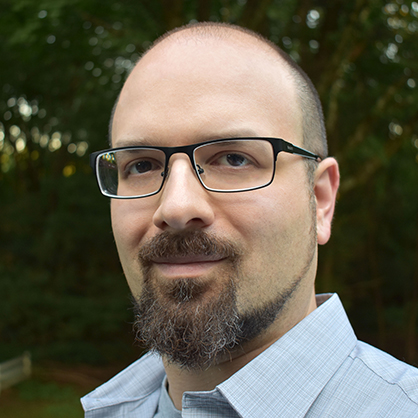In the Media
Psychology Today: Why Do People Spread Conspiracy Theories?
Jeffrey Debies Carl, associate professor of sociology, examines why people spread conspiracy theories in part one of a two-part series.

Ph.D., Sociology, Ohio State University
M.A., Sociology, Ohio State University
B.A., Sociology/Anthropology, Kent State University
One foundational lesson of sociology is that context matters. My research builds on that principle by investigating the physical and virtual environments in which social life occurs. Whether they are tangible, digital, or increasingly a bit of both, the places around us are partly the product of social action and partly an influence on those actions. We create these environments based on our needs and desires but, once created, they can exert their own influence back on us. My work examines how they influence our feelings, thoughts, behaviors, social organization, and culture, as well as how these in turn shape the environment itself. To examine these processes, I use diverse methodologies ranging from quantitative applications to ethnographic methods. Substantively, I have examined the role of environmental context across a diverse range of specific topics. For example, my work has addressed many questions like the following:
My overarching goal in this research is to improve our understanding of the significance of the environment in everyday life and, in the process, invigorate sociology’s contributions to this interdisciplinary concern.
See MoreAs an educator, it is my mission to cultivate and encourage the inherent drive to learn new things and apply these lessons to the world around us. I believe learning should not be a chore, that it should emphasize the relevance of lessons to our lives or other interests, and that whenever possible it should occur through experience. I teach a wide variety of courses, ranging from Introduction to Sociology and Social Psychology to Qualitative Methods and Simulations, to name a few examples. I am also an enthusiastic supporter of student research and am always pleased to advise, mentor, or otherwise encourage emerging researchers.
Practice with research is important to cultivate the ability to produce and not simply consume knowledge. However, experience with the methods and logic of scholarly inquiry are beneficial for everyone, not just aspiring researchers. A strong familiarity with these tools empowers us all by allowing us to evaluate critically whatever claims we hear and to make informed decisions in our everyday lives.
In the Media
Jeffrey Debies Carl, associate professor of sociology, examines why people spread conspiracy theories in part one of a two-part series.
In the Media
Jeffrey S. Debies-Carl, professor of psychology and sociology, comments on why fans buy into superstitions, saying, 'If you’re capable of thinking, you’re capable of superstition.'
In the Media
Jeffrey S. Debies-Carl, professor of psychology and sociology, examines why people may believe in paranormal phenomena despite there being no hard evidence to support the existence of anything paranormal.
In the Media
Jeffrey S. Debies-Carl, professor of psychology and sociology, writes in his new book about the phenomenon of legend tripping.
In the Media
Jeffrey Debies-Carl, associate professor of sociology, comments that the raw footage of videos from the war in Ukraine may be disturbing, but censoring it leads to sanitization of the atrocities happening on the human side of the conflict.
In the Media
Jeffrey Debies-Carl, associate professor of sociology and psychology, says the public is skeptical of government and corporate leaders, who, in past situations, such as the case of the contaminated drinking water in Flint, Michigan, covering up the realities of a disaster event.
In the Media
Jeffrey Debies-Carl, associate professor of sociology and psychology, comments on several online community groups that choose to be anti-car.
In the Media
Jeffery Debies-Carl, associate professor of sociology, says the most effective way to make people feel safer is to have additional security at outdoor events, rather than allowing a few recent incidents to shut down society.
In the Media
Jeffrey Debies-Carl, professor of sociology, says nothing is new about political sides choosing to use a conspiracy theory to bolster their position.
In the Media
Three professors, Amy Baker, professor of psychology and assistant chair of psychology and sociology; Jeffrey Debies-Carl, associate professor of psychology and sociology; and Mo Cayer, distinguished lecturer and coordinator of the M.S. in Human Resources program, comment on the importance of separating work from off-hours in order to be more productive professionally and personally.
In the Media
Jeffrey Debies-Carl, associate professor of sociology, comments on all things good about being in the public space.